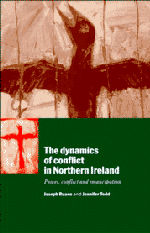Book contents
- Frontmatter
- Contents
- List of figures
- List of tables
- Preface
- 1 Introduction
- 2 Historical formations
- 3 The reconstruction of communal division
- 4 Ideology and conflict
- 5 The dynamics of conflict: politics
- 6 The dynamics of conflict: the economy
- 7 The dynamics of conflict: culture
- 8 The British context of the Northern Ireland conflict
- 9 The Republic of Ireland and the conflict in Northern Ireland
- 10 The international context
- 11 An emancipatory approach to the conflict
- Epilogue
- Appendix
- Bibliography
- Index of names
- Index of subjects
5 - The dynamics of conflict: politics
Published online by Cambridge University Press: 18 December 2009
- Frontmatter
- Contents
- List of figures
- List of tables
- Preface
- 1 Introduction
- 2 Historical formations
- 3 The reconstruction of communal division
- 4 Ideology and conflict
- 5 The dynamics of conflict: politics
- 6 The dynamics of conflict: the economy
- 7 The dynamics of conflict: culture
- 8 The British context of the Northern Ireland conflict
- 9 The Republic of Ireland and the conflict in Northern Ireland
- 10 The international context
- 11 An emancipatory approach to the conflict
- Epilogue
- Appendix
- Bibliography
- Index of names
- Index of subjects
Summary
Partition was a pragmatic acknowledgement of the realities of economic and military power on the two islands at the beginning of the century (chapter 2). It also set the conditions for the renewal of the historical alliance between Irish Protestants and the British state, this time in the narrow ground of Northern Ireland. The reconstituted alliance was given institutional expression in the Government of Ireland Act of 1920 and in the conventions that grew up to regulate relations between Northern Ireland and Westminster. The new political arrangements would last for fifty years. In this chapter we look at the changing power relations underlying the British state/Protestant alliance and its institutional forms. We explain why the earlier settlement collapsed and why it has been so difficult to find an alternative.
The settlement of 1921
The reconstituted alliance between the British government and Northern Irish Protestants was a consequence of British policies, not their intent. The desire to keep Ulster within the empire was strong among sections of the British elite, but the overriding British priority was a stable Irish settlement distanced from British politics: in the Treaty negotiations and after, it became clear that a friendly home rule administration in Ireland as a whole was more attractive to the British government than respecting Ulster unionist wishes. But the prior British decision not to force Northern Protestants into a home rule parliament, together with the determination to avoid overt British control anywhere in Ireland, guaranteed that British governments would – more or less willingly – uphold the unionist interest in Northern Ireland.
- Type
- Chapter
- Information
- The Dynamics of Conflict in Northern IrelandPower, Conflict and Emancipation, pp. 116 - 149Publisher: Cambridge University PressPrint publication year: 1996

